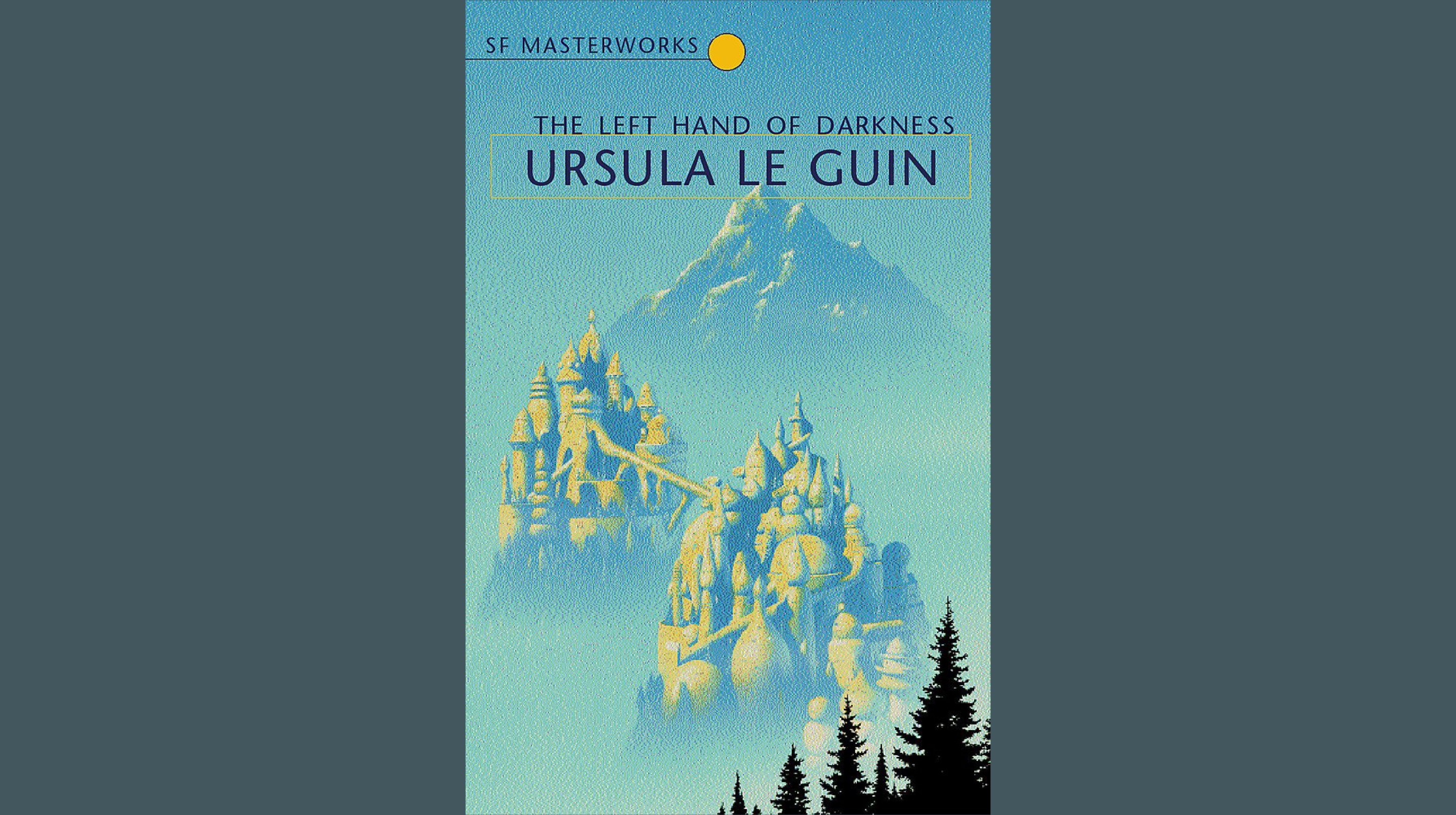Welcome back to Defector Reads A Book! Our October DRAB selection was Ursula K. Le Guin's The Left Hand of Darkness, which the Defector book sickos have read and discussed. We’ll be down in the comments to chat with you as soon as you’re done reading.
Giri Nathan: So I can’t speak for the whole group but I was expecting to parse through unwieldy Phantom Menace–style alien trade policy and not so much to have my heart shattered by a tender and tragic alien romance that occupies most of the book. I was delighted to be wrong on that count.
Barry Petchesky: The love story also really caught me off-guard, and I felt extremely dumb for not having seen it coming until Genly’s and Estraven’s trek across the ice. I think in retrospect it’s because I was still thinking in Earth terms about sex and gender, which is partly my own blinkering and partly being in the head of Genly, who also never really grasped all the implications of kemmer until it was staring him in the face.
Maitreyi Anantharaman: As a reader, there’s so much that is devastating and frustrating about their relationship, which is funny—a supposed hallmark of Gethenian society is a lack of those things. I’m still reeling from the whiplash of it all! These beautiful, moving, incredibly sweet passages and bits of dialogue and then also these soul-crushing tragedies.
GN: Estraven’s death is the saddest thing I’ve read in a while, all the more so because of Le Guin’s incredible restraint, how she just gives you a few graphic discrete details and a few bolts of emotion (and also a suggestive detail—he hears Arek’s voice at the end), and doesn’t linger too long. It just happens so suddenly, in both the timeline the characters are living and the text itself. And then it’s over.
BP: Loss is the inevitable, eventual price of love. Estraven learned that with his sibling and their child, and Genly learned it when he had to let everyone he ever knew age and die while he traveled the galaxy out of love for the Ekumen’s mission (or rather for “mankind,” as he would put it), and just days or weeks after the two found understanding in each other, they were split forever because each’s loyalties were to larger ideals.
GN: It’s understandable because the story’s told from Genly’s point of view, and he doesn’t need to convince himself of his own worldview, but the book doesn’t dwell on the fact that he is a total political zealot. Like, this is the most extreme possible form of missionary or ambassador work. He’s willing to cast aside his entire world and everyone he has ever known back home for the well-being of the Ekumen. And there’s not a great deal of introspection about that choice in these pages.
BP: The book also doesn’t dwell on the possibility that the Ekumen is anything other than noble and enlightened and “the good guys.” Because we’re only shown the petty and self-destructive infighting of two Gethenian polities, we’re led to buy into the Ekumen’s mission without questioning it. Seems dangerous!
MA: And for all Genly’s insinuation that Karhide is a backward and suspicious place whose isolationism is a barrier to enlightenment, we do get some glimpses at his own regressive ways of thinking. He’s kind of sexist! He’s repulsed by the femininity of Estraven, suspicious of his "womanly" qualities. He even gets a bunch of digs in at the landlady.
BP: He’s quite sexist! Every time a character does something he views as “effeminate” he turns sour on them. In a lot of ways this book is sort of his journey toward being a little better about this. His big come-to-Jesus (come-to-Meshe?) moment is when he’s forced to admit he understands human women far less than he does this literal alien species.
GN: There’s also that line he has about the woman’s brain being unable to produce great music or math. And yeah, so much of the tension of this book can be attributed to Genly being locked into this Terran bisexual worldview, which blinkers him to all the machinations around him, and even to the fact that he’s in love.
BP: Le Guin said, “I eliminated gender, to find out what was left.” So all the tension comes from a narrator who cannot eliminate everything he knows and has learned about gender, and—I think this is bigger—being a reader who also comes into this with my own preconceived notions. For example, I’d be lying if I didn’t say I didn’t picture characters a certain way just because Le Guin used the pronoun “he” for them.
MA: I gather that was a criticism of the book when it first came out, that she’d used “he.”
BP: She said later she regretted that choice. I know that for a later short story set on Gethen, she decided to use “she” for everyone instead. Then in a later interview she just admitted that the critics were probably right and she should have just used “they.”
GN: Given how rich a world she was able to fully invent, it’s a little funny—and in line with the book’s themes—that she was held back by something as basic as the menu of English language pronouns. And how we, as English speaking readers, feel our mind’s eye hampered by seeing all those “he”s in the text.
BP: Real Sapir-Whorf hours.
GN: She even did the “number of words for snow” thing, which has probably been debunked and rebunked a million times since publication.
BP: Going back a bit, I just want to say I was also a bit wrong-footed by what this book was compared to what I expected. I thought it was going to all be “about” gender, because that’s its legacy that has most penetrated pop culture, so I was surprised that the plot was all political intrigue and then an adventure story. The ambisexuality was there, but it was so rarely front-and-center to the narrative (and when it was it hit like a haymaker). This feels to me like genius worldbuilding on Le Guin’s part. Because it was there, always in the background, the gender stuff suffused everything. A really brilliant treatment of how omnipresent it is in our own lives even when we don’t think about it.
MA: That reminds me of a very good essay Lauren Michele Jackson wrote last year about the dubious purpose of the “anti-racist reading list.” It would be odd to say The Bluest Eye is about racism; rather, she writes, “racism is relevant to the story to the extent that it is relevant everywhere...racism is the environment—the weather, the climate—and it makes the seasons turn, which is to say that it is happening all the time.” Gender is at once suffocating and incidental.
GN: I like how many different passes the book takes at this idea. We’re grounded in Genly's not terribly rigorous real-time theorizing about how ambisexuality shapes Gethenian society, but we also get Estraven's expert local opinions, those early Investigator notes with an anthropological feel, peeks into fringe mystic societies where this unique biology is the engine, myths and folk-tales. So many perspectives, and none of them feel super-didactic, like the author is force-feeding you a history textbook or Karhidish-to-English phrasebook.
BP: From the investigator’s field notes on ambisexuality: “One is respected and judged only as a human being. It is an appalling experience.” I laughed at first, then did a double-take, like, “Oh. Huh.”
MA: This book is so explicitly anthropological, and still that element gets to be a base for all this other storytelling and gorgeous language. Can we talk about the language? Sometimes it takes me an entire book to realize just how much I’ve loved it, but I think this one had me from the first line. The way vivid description—especially in the section where they cross the Gobrin ice—lapses into the metaphysical and then back again. So good! So so good!
GN: It’s a testament to how many different things this book is doing that Le Guin’s ridiculous prose ranked low on the list of my priorities as I read it. But I have tons of dog-eared pages: casually aphoristic dialogue, bits about Estraven turning the wheel of luck, description of the Handdara rites, impressionistic sketches of geology and geography.
BP: Their journey across the ice was so good. Like, a better description of hardship and endurance and cold than I’ve ever come across, fiction or non-fiction. And weirdly I’ve read an awful lot of books about ice journeys. At one point the text made me literally feel cold, to the point where I turned the heat up in my apartment. But yes it’s almost unfair how many cylinders Le Guin was hitting on here. The ideas are great. The prose is great. The characters are great. It’s almost maddening; one author’s not supposed to be so good at so many different things.
MA: Have you read the publisher’s rejection letter she shared on her website?
BP: No!
MA: It’s amazing.
Dear Miss Kidd,
Ursula K. Le Guin writes extremely well, but I'm sorry to have to say that on the basis of that one highly distinguishing quality alone I cannot make you an offer for the novel. The book is so endlessly complicated by details of reference and information, the interim legends become so much of a nuisance despite their relevance, that the very action of the story seems to be to become hopelessly bogged down and the book, eventually, unreadable. The whole is so dry and airless, so lacking in pace, that whatever drama and excitement the novel might have had is entirely dissipated by what does seem, a great deal of the time, to be extraneous material. My thanks nonetheless for having thought of us. The manuscript of The Left Hand of Darkness is returned herewith. Yours sincerely,
The Editor
21 June, 1968
GN: This feels immediately disqualifying in the way that, as I mentioned in hoops Slack yesterday, I recalled a high-volume NBA poster, leading up to the draft, snootily dismissing Ja Morant’s … athleticism. You have failed at the fundamental task of your job and should not have it anymore. Your judgment is forever tarred.
BP: Basketball for Giri is like sexuality on Gethen: always there in the background.
MA: It seems like the editor’s objection here is to the world-building she does, sometimes in the form of the “interim legends” that come between chapters but also with these untranslatable concepts and notions—shifgrethor, for one.
BP: An awful lot of popular sci-fi at the time was fundamentally unserious adventure stories; the sort of stuff that gave the genre a bad name. Le Guin’s crime may have been thinking a fully filled-in world helped elevate the plotting. She was right, of course. The whole metafictional aspect of the storytelling—the field notes and local myths and journal entries—do so much more for the story than just break up the POV. This world feels lived in. The untranslatable words are part of that. The untranslated words too: Does it serve any purpose other than immersion to use the Gethenian words for days and months? No. Is the book better for it? Absolutely.
GN: The enjoyable thing about shifgrethor was realizing that this is a fundamental concept undergirding their society while also realizing that Le Guin was absolutely not going to spoon-feed us some clean definition of it. So you piece it together with every usage. It’s a mish-mash of prestige, rank, and rhetorical higher ground. It’s this vague judo governing everything from minute dinner-table interaction to bubbling geopolitical strife.
BP: Yeah! The closest she came to defining it was telling us that its literal meaning was “shadow.” Which gave me a better understanding than any attempted translation would have been.
MA: I think I understood it best when it was “waived.”
BP: I laughed when it became clear that “giving direct advice” was Estraven’s way of conveying that he was furious with Genly. And then of course that became a tragedy when shifgrethor stood between the two finding a mutual understanding that could have prevented tragedy.
GN: With all the talk of duality and oneness, the Handdara poem that gives the book its title, Genly’s introduction of yin and yang, it felt right that this pair wound up stuck on the border, unable to make a decision together, each one an outlaw in one country, forced to (suicidally?) pick a side to advance the larger goal of unification.
BP: This is sort of the tension between the two faiths on Gethen, right? Yomesh is an all-one singularity, omniscient but unreachable by any save its founder, while Handdara is the religion of duality, of incompleteness without the struggle between light and darkness, and it describes a world that can be touched by its practitioners. I do not know enough about Le Guin’s apparently legit Taoist bonafides to say how that influenced this book, but it feels telling that Estraven is Handdarata, and that it’s a hearth religion rather than a cosmic one, and that its Foretellers can in fact reach literal truths.
MA: I wish I’d finished this like a day or two earlier, because I keep thinking about Le Guin and religion and haven’t landed anywhere satisfying. (Curse you, DRAB deadline! Let me dwell!) But there’s that line from Faxe: “The only thing that makes life possible is permanent, intolerable uncertainty: not knowing what comes next.” And that seems to describe Le Guin's profession quite well too. The introduction she wrote for this book—go back and read it if you skipped over it!—is a fantastic essay on science fiction, which she said was “not predictive; it is descriptive.” She arrived at her truths “in the novelist’s way, which is by inventing elaborately circumstantial lies.”
BP: Genly would agree with that notion, I think: “[I]f at moments the facts seem to alter with an altered voice, why then you can choose the fact you like best; yet none of them is false, and it is all one story.”
GN: We end with Genly preparing himself to tell Estraven’s story to Estraven’s son—conceived with his brother Arek, who died not long after, in unclear circumstances—and father. We know it’s a story that Estraven has already told, with great skill, to the rural Karhiders who them in after their journey across the ice. And then the son also wants to hear about “other worlds out among the stars—the other kinds of men, the other lives.” Did you guys like how the book wound down?
MA: Yes. Ursula K. Le Guin, congratulations, you fucked me up.
BP: I did like it. For me the true tragedy was that pulling out in scale, going from two men to one isolated fishing village concerned with hearing a tale of adventure, to the spaceship’s landing, all the way to the son’s overriding interest in the stars beyond, to show just how meaningless Estraven’s life and sacrifice were in the grand scheme of the Ekumen, or at least how meaningless it would be when remembered by history. Dozens of worlds, billions of souls—what is one person’s story, no matter how heartbreaking, compared to that? What is love worth in the face of the universe?
DRAB will be in the comments for the next couple of days to hear your thoughts and chat with you. If you missed out on this month’s book, don’t worry! November is a new month and we’ll announce our next pick soon.






